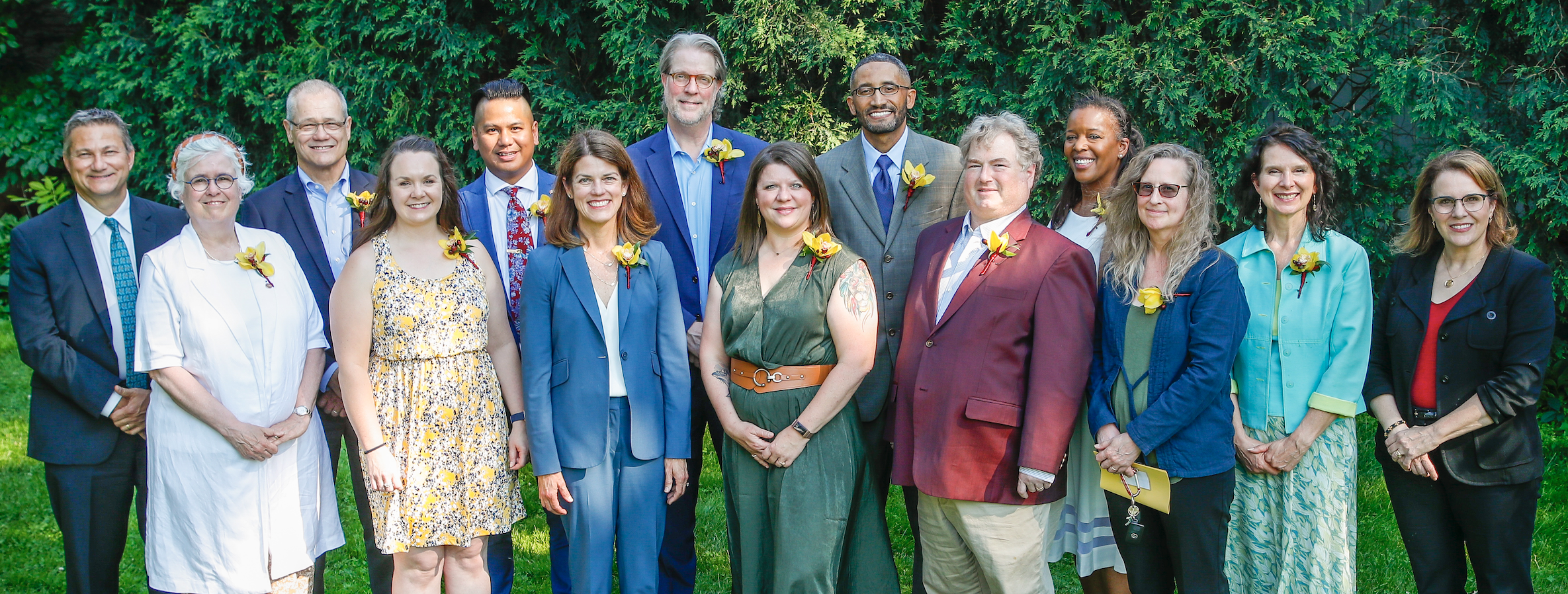
Lisa Erwin
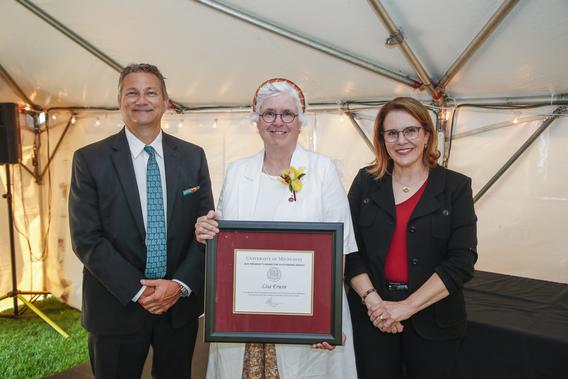
Lisa Erwin, vice chancellor for student life and dean of students, Division of Student Life, University of Minnesota Duluth (UMD), joined the University in August 2011. Her primary focus and drive are centered on what is in the best interest of students, and under her leadership, Student Life at UMD focuses on commitments to learning, well-being, inclusion, stewardship, and service. Her compassion for students is exemplified by her role as chair of the Student Care Team, which is responsible for addressing issues related to student behavior. Over time, Erwin shifted the primary vision of this group away from monitoring threats and towards providing support for students in need of care or who are experiencing distress. She recognizes that, with the right resources, students can bounce forward from difficult situations and thrive. Erwin’s colleagues frequently cite her initiative and her willingness to assume leadership both within UMD and within the University of Minnesota system. For example, Erwin convened the UMD COVID Operations Team in 2020 to allow for collaborative strategizing and clear communication. Together with that team, she guided UMD through various service modalities, safety protocols, budgetary impacts, and human resources processes - all while many of her counterparts departed the institution and interim leaders were named. Her willingness to guide the campus through the pandemic made a momentous difference in the UMD community. As Erwin’s tenure has grown, so has her responsibility and the recognition that she can successfully lead in a breadth of areas. When the Office of Sustainability and Alumni Relations were struggling, she stepped up and assumed supervisory responsibility. In addition, Erwin proactively convened the student affairs leadership from each of the five campuses. In this time, Erwin called their monthly meeting, prepared the agenda, and managed their numerous collaborative projects, which she continues to do. Also, in addition to her own departments, Erwin actively supports UMD Athletics, many academic initiatives, and campus community celebrations. Her expertise also expands into Title IX and student affairs law and policy, and she has worked at the national level on the Violence Against Women Act and various Title IX issues and served as UMD’s previous Title IX coordinator. Her national professional service is extensive, and in 2021 she received the Scott Goodnight Award for Outstanding Performance as a dean, the highest award the National Association of Student Personnel Administrators bestows on individuals who serve as a senior student affairs officer, and only one of the multiple significant honors she has received from them. Even though her portfolio of Student Life departments is large and complex, she provides energy and innovative leadership to them all, and her passion and love for UMD students never waivers. One of her letter writers wrote that “Erwin is the most caring colleague I have known. She is sincerely concerned about everyone’s well-being, whether it is students or colleagues. She is the first one to offer ideas and support and she has an amazing sense of humor. I know the students on the Duluth campus absolutely adore her. She truly exemplifies leadership, caring, and a ‘can-do’ attitude in all she does.”
John Finnegan Jr.
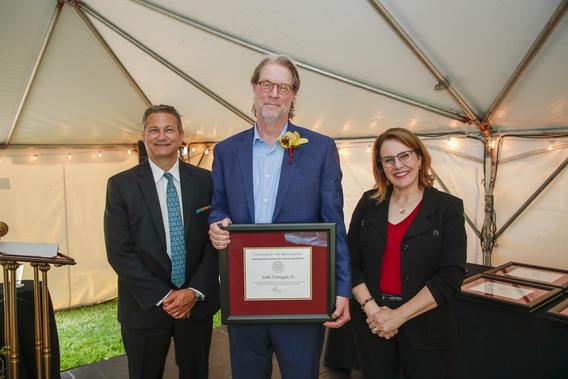
John Finnegan Jr., professor and dean emeritus, School of Public Health (SPH), University of Minnesota Twin Cities, served the school for more than 40 years, beginning as a University student (PhD ‘85, Journalism) working on community health promotion campaigns, and ending with his retirement on January 31, 2022. As a faculty member, Finnegan moved into leadership positions, serving as associate dean for academic affairs, associate dean for research and academic affairs, interim dean, and, in 2005, dean. In each role, Finnegan advanced the school’s strengths and academic mission, including increasing enrollments, substantially diversifying the faculty and student body, and improving national rankings of key programs. What is equally important, however, is the unifying professional vision that has directed Finnegan’s efforts and the passion that has fueled them: a vision of health and well-being. One example of Finnegan’s commitment to a broad vision of well-being can be seen in his leadership of the President’s Initiative to Prevent Sexual Misconduct (PIPSM). In 2017, Finnegan was asked by then-president Eric Kaler to chair the effort to develop a comprehensive University plan for the prevention of sexual misconduct. Finnegan oversaw the initiative’s implementation during the last few years of his time at the University, and the fact that this work is still going strong is a testament to the resiliency of Finnegan’s general plan, one aimed at both individual and cultural transformation. Additionally, SPH established a leadership position in diversity, equity, and inclusion (DEI) in 2002 and, during Finnegan’s tenure, the school’s DEI efforts grew in size and focus. The murder of George Floyd led the school to a soul-searching process about racism as a public health emergency and the school’s own role in sustaining structural racism. The school’s five-year Strategic Plan for Antiracism is one result of this exploration. Schools and colleges across the nation have sought guidance from Finnegan and SPH’s DEI office on how to enact similar efforts. Finnegan was also an active leader of the Association of Schools and Programs of Public Health (1998-2022). One of Finnegan’s most significant and lasting contributions to academic public health was his visionary leadership as chair of the 2012-2015 Framing the Future: The Second Hundred Years of Public Health Education Taskforce examining all aspects of public health education. His efforts led to the adoption of revised accreditation criteria by the Council on Education for Public Health, resulting in the transformation of the master of public health (MPH) curriculum in schools and programs of public health in the United States and internationally. His nominator wrote: “His service to SPH was heartfelt and progressive, and his contributions were created in the genuine spirit of doing what is right and best for the people in our school and larger community.”
Christina Gallup
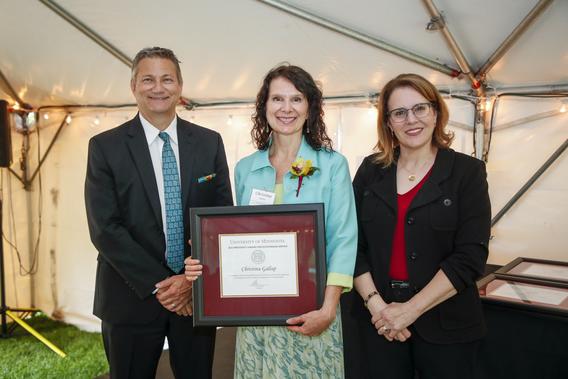
Christina Gallup, associate professor, Department of Earth and Environmental Sciences, Swenson College of Science and Engineering (SCSE), University of Minnesota Duluth (UMD), began her career at the University in January 2000. Her service includes significant contributions to the SCSE and to UMD as a whole. For example, Gallup began her time as chair of the SCSE executive committee when a new dean arrived. During her tenure, Gallup transformed the SCSE faculty assemblies into a space where the faculty could have substantive discussions with executive committee members about issues of importance in the college. As a result, the assembly was able to explore matters such as teaching loads and protocols, UMD budget restructuring, and the Campus Climate Survey results, many of which were discussed for the very first time. Gallup continued working to keep campus climate issues front and center in the college’s priorities, especially on behalf of women and underrepresented groups. In fall 2018, the UMD Faculty Senate held an assembly titled Gender Equity: Addressing Discriminatory Behavior and Inequitable Resources Allocations among UMD Faculty. Findings, which suggested that, in some colleges, there were zero women in department head positions, inspired Gallup to continue to work on climate issues in the college by volunteering as chair of the Multicultural and Diversity Committee. Her work on campus-wide anti-racism efforts includes the coordination of the inclusive “bottom-up” Anti-Racist Learning Community, which is intended to identify systemic inequities, carve out creative solutions, and implement these solutions by securing necessary collaborations with relevant leadership teams across the University. This work, which is ongoing, was presented at the University of Minnesota’s Keeping Our Faculty symposium held on March 3 of this year. One of Gallup’s colleagues wrote: “I personally witnessed her level of commitment through countless meetings, pre- and post-meetings, emails, and phone calls as we strategized agendas and action items and supported and advocated for those who suffered injustices and indignities.”
Kat Hayes
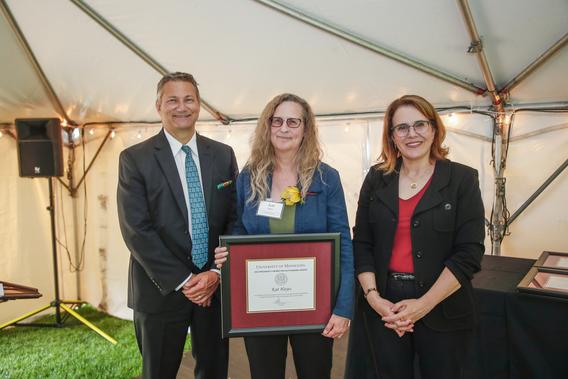
Kat Hayes, associate professor, Department of Anthropology, College of Liberal Arts, University of Minnesota Twin Cities, joined the University community in 2008. Since that time, her program–building work within and across departments, between colleges, and at the intersection of academic and community organizations, evinces her passion for advancing equity and diversity. She has played a leading role in two important initiatives that have transformed the University in significant ways: the Heritage Studies and Public History (HSPH) program and the Center for Race, Indigeneity, Disability, Gender, and Sexuality Studies. Hayes led the process of conceptualizing, planning, and implementing HSPH, resulting in its launch in fall 2017. This interdisciplinary program (masters and PhD minor) is the only one of its kind in the world, featuring an innovative curriculum that trains practitioners in historical archaeology, historic preservation, and public history through collaborations with the Minnesota Historical Society and other community organizations and heritage institutions. Importantly, it supports BIPOC, LGBTQ+, and first-generation students in multiple ways, including focusing on social justice and the study of historical narratives. She was also an active member of the President’s and Provost’s Advisory Committee on University History, a group that did tremendously valuable work uncovering concerning actions and attitudes of a number of figures who played central roles in the history of the University of Minnesota, which helped set the foundation for the recently revised Board of Regents Policy: Namings and Renamings. Hayes has also committed herself to the process of making the University a more just institution, one that acknowledges and addresses its complicity in historical harms in the pursuit of justice. Collaborating with Indigenous faculty, students, and staff, and engaging with stakeholders far beyond the University, she has been tireless in her efforts to repatriate Mimbres remains and associated funerary objects still held by the University. In addition, those fortunate enough to be mentored by Hayes expressed their appreciation in her nomination dossier for her openness and her ability to recognize those she works with as whole people as compared to solely a colleague. As one of her colleagues wrote: “Professor Hayes is, simply put, the best of multiple worlds. A dream colleague, she is a brilliant scholar, a wise leader and fierce advocate, a dogged and thoughtful program-builder, and an inspiring teacher – and she manages to navigate all of the above with a generosity of spirit, unparalleled humility, steadfast and sustained commitment, and a disarming sense of humor. In all of her endeavors … Hayes creates spaces of critical thought, reflection, and pedagogy, with an attention toward social justice and community engagement.”
Duane Johnson
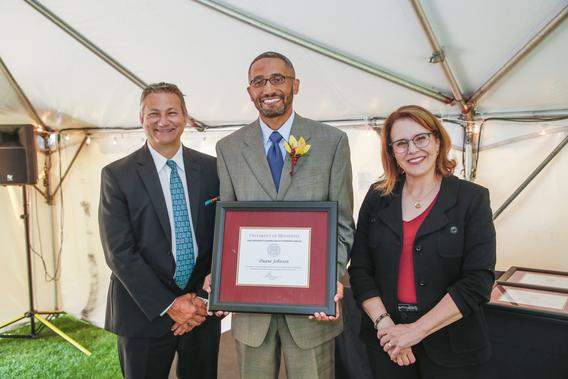
Duane Johnson, buyer, U Market Services, Auxiliary Services, University of Minnesota Twin Cities, has worked in his current position for six years. Johnson provides oversight for U Market stock products, confers with customers concerning items to be purchased and makes recommendations, researches and forecasts purchasing trends, collaboratively oversees vendor compliance for lab equipment and supply vendors on U Market, negotiates contracts with vendors, and analyzes data. Johnson works tirelessly advocating for minority and Black-owned businesses by connecting these businesses to the University and helping make the University more accessible to those communities. Johnson received both his undergraduate and graduate degrees from the University and is in his 12th year as a University employee, having previously worked as an Upward Bound academic advisor in the College of Education and Human Development. As an active member of the Black Faculty Staff Association, Johnson has been a board member at the Penumbra Theatre Company since 2014, representing the University of Minnesota. Progressive and forward-thinking, Johnson co-founded Tuloko, an app that is the largest national database of Black-owned businesses ever created, while he was a full-time employee and graduate student at the Carlson School of Management. Tuloko, which is derived from Tulsa, Oklahoma - the site of the early 20th century Black business district known as Black Wall Street - was a startup winner in the Minnesota Cup competition, was featured on CNN and Chanel 5’s Greater MSP Business and has been funded by the University of Minnesota’s Center for Urban and Regional Affairs. Recently, Johnson was recognized by USA Today as a Leader for Change for his work in supplier diversity at the University of Minnesota and with Tuloko. His editorials on business equity and diversity have been published in both the Star Tribune and the Wall Street Journal. In short, according to his nominator, “His dedication to the mission of the University of Minnesota has been an asset to not only the state of Minnesota, but also to the entire country. He embodies the attributes of equity and diversity in his work and goes beyond the talk.”
Joseph A. Konstan
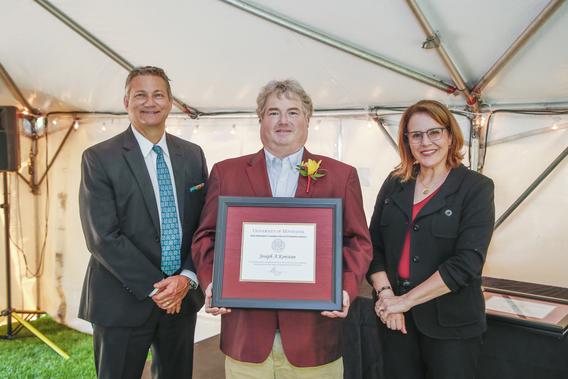
Joseph A. Konstan, professor, Department of Computer Science and Engineering, and associate dean for research, College of Science and Engineering, University of Minnesota Twin Cities, began his career at the University in 1992. Since then, he has established himself as an exceptional scholar, teacher, and leader. As a scholar, Konstan is considered a world leader in human-computer interaction and a founder of the field of recommender systems, which is software that uses community preference data for personalization (individuals who place orders through Amazon or watch movies on Netflix may be quite familiar with this software). Konstan is also a highly awarded and innovative teacher who transformed his department’s introductory and service teaching, while serving as an early adopter of massive online instruction and creating a curriculum in human-computer interaction. His multiple teaching awards include the University of Minnesota Award for Outstanding Service to Graduate and Professional Education (2010), the George Taylor/CSE Alumni Society Award for Distinguished Teaching (2013), and designation as a McKnight Distinguished Teaching Professor (2010). Konstan has also accepted calls for service to the University of Minnesota from the very first year he joined the institution. He has been extremely generous with his time and talents and has significantly and positively shaped our institution in countless ways. During his time as the director of Graduate Studies for the Master of Science in Software Engineering program, for example, Konstan played a key role in removing a significant impediment to graduation for working professionals in the program by adding a Plan-C (coursework only) master’s degree - a change which is now an option for all graduate programs. Konstan has served the broader University community through his membership on the original strategic planning workgroup appointed by former president Eric Kaler and former executive vice president and provost Karen Hanson, as well as his invaluable service to shared governance. As chair of the Senate Committee on Faculty Affairs as well as his later service as vice chair and chair of the Faculty and Senate Consultative Committees, Konstan fostered constructive campus and University engagement with an exceptionally daunting number of important equity, climate, and social justice issues, including, but not limited to, child care, student mental health, the reexamination of honorific building names, non-discrimination policy on gender identity and pronouns, and parental leaves. Leaders from across the University system continue to seek his wise and steady counsel on issues affecting our community. According to one of his colleagues, “He is especially skilled at finding connections across the system to create unique ways to address some of the most complex issues this institution has faced, [which is] why Dr. Konstan is continually sought-after for his vast knowledge of the system and how it works to create strategies for some of the most complex issues this institution has faced.”
Kathryn Pearson
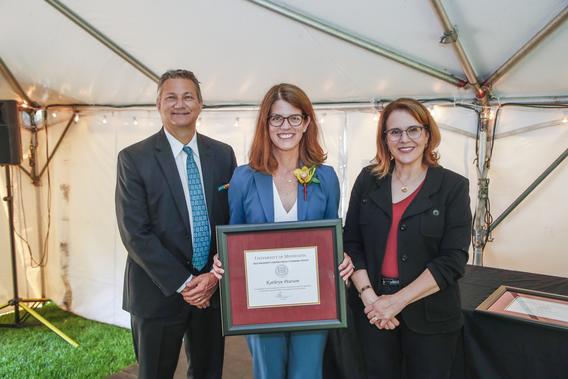
Kathryn Pearson, associate professor, Department of Political Science, College of Liberal Arts, University of Minnesota Twin Cities, is a gifted and devoted educator whose contributions have advanced the undergraduate mission at the University. She is an exemplary role model for how citizens can engage civilly in a deeply polarized state and nation and is frequently invited by media outlets and political organizations to moderate political discourse. In the classroom, Pearson is a devoted and tremendously effective teacher, and her classes are among the most popular offered by the Department of Political Science. She has served on either the thesis committee or as an advisor for more than 40 undergraduate students, advised seven PhD dissertations, and served on 15 additional PhD dissertation committees. These and other contributions to the University’s educational mission explain why Pearson was awarded the highest award the University bestows for undergraduate education: the Horace T. Morse-University of Minnesota Alumni Association Award for Outstanding Contributions to Undergraduate Education (2012). Pearson’s current research centers on the role of women in legislatures, analyzing how changes in the gender composition of legislatures affects political polarization, legislative voting, and oversight. When, in 2019, Congress decided to study ways in which to modernize its operations, the American Political Science Association formed a task force to advise the relevant subcommittee in the U.S. House of Representatives. Pearson was appointed to chair the Task Force Subcommittee on Staff Retention and Diversity. The resulting report was so well-crafted and insightful that the House subcommittee asked to hear her testimony. Hundreds of professors study Congress, but only a very select few lead national task force subcommittees and testify before the U.S. House of Representatives. Pearson’s commitment to both University service and public outreach are extensive, and she has served in the following capacities at the University, among many others: member (2014-2019) and chair (2020-present) of the Council on Liberal Education; co-chair of the University of Minnesota Child Development Center (UMCDC) Parent Advisory Committee (2018-2020); keynote commencement speaker, College of Continuing and Professional Studies (2018); and member of the Provost’s Grand Challenges Curriculum Issue Team (2014). Pearson’s national outreach and service include membership on the executive board of the Midwest Political Science Association (MPSA), service on the editorial board of the Politics and Gender journal (2007-2010 and 2013-2016), and service as the faculty associate and co-chair of the Board of Advisors of the Center for Effective Lawmaking, a center jointly funded by the University of Virginia and Vanderbilt University. One letter writer wrote, “I can think of no congressional scholar, and very few political scientists more generally, across the United States who have shown Pearson’s commitment and skill at communicating what our research has to say to a broader community, and at providing context for ordinary citizens as they seek to understand the political world.”
Chuck Tomlinson
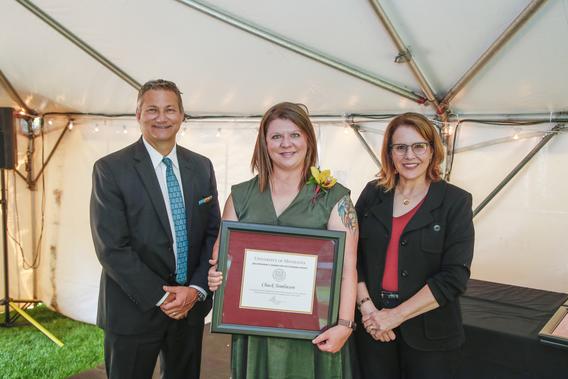
Chuck Tomlinson is the director of operations in the Department of Chemistry, College of Science and Engineering, University of Minnesota Twin Cities. The magnitude and breadth of his responsibilities are truly remarkable, ranging from oversight of all financial, human resources, and facilities issues to translating policy matters and logistics among stakeholders within the Department of Chemistry and across the University. He has provided direct support and mentorship to many staff members in and outside the Department of Chemistry and has supported the work of faculty in countless ways. The hallmark of Tomlinson’s interactions with colleagues and students is the respect, compassion, and humility which guide his every interaction. Tomlinson has been integral in the development and success of the Department of Chemistry’s Safety Committee. Known as the “Minnesota Model,” the work of the Safety Committee has been emulated by dozens of universities across the country, and much of the success of the department’s safety culture is a result of Tomlinson’s collaborative approach. He repeatedly demonstrates his problem-solving talents by including all voices impacted by a situation and committing to extensive behind-the-scenes investigation and exploration to find equitable solutions for everyone involved. Because he understands the value in building partnerships and being in collaboration with others, Tomlinson is frequently sought out by colleagues, leadership, and partners in other units, for his advice. One of his strongest assets is seeing value in everyone and wanting them to see the same in themselves and others. He has been called upon to serve on both large, formalized committees, and small informal groups, including the East Bank/North Campus Advisory Committee and the Department of Environmental Health and Safety, among others. Tomlinson was an integral safety point-person during the University’s COVID-19 shutdowns, not only for the Department of Chemistry, but across all laboratories on campus. Tomlinson’s nominator wrote, “The phrase most often associated with Chuck is, ‘How can I help?’ and then he does, regardless of the issue at hand, with skill and understanding.”
Kelsey Torgerson
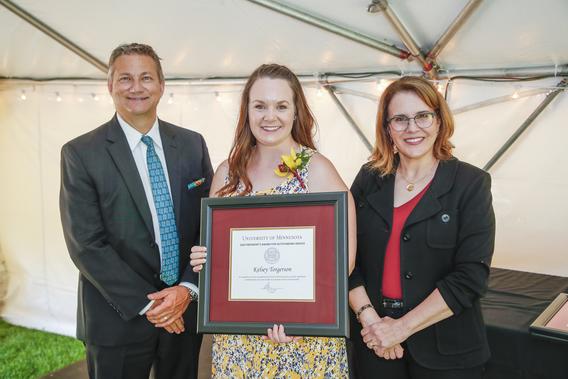
Kelsey Torgerson is a STEM academic advisor in the Student Success Center (SCC), University of Minnesota Crookston (UMC). In addition, she is an adjunct teaching specialist for teaching first-year experience courses and a master tutor for math and science. Colleagues have called her a dedicated, efficient, and resilient academic advisor who shows compassion and empathy for the students she serves. Building and nurturing relationships with faculty, supporting students - especially in times of crises, and developing and refining systems and processes for supporting students are the hallmarks of Torgerson’s involvement on campus. In recognition of the number of online students attending UMC, Torgerson became a driving force for promoting quality online tutoring services. When the SCC was looking to formalize its tutor training program, Torgerson was instrumental in developing measurable learning objectives that helped UMC earn (in 2016) and recertify (in 2017 and 2020) the International Peer Tutor Training Certification recognition through the College Reading and Learning Association (CRLA). In 2021, UMC became one of only three universities in the United States to be recognized for their certified online tutor standards and training, due in large part to Torgerson’s focus, resourcefulness, and passion for supporting students. In 2018, Torgerson began submitting conference presentation proposals and was soon a sought-after presenter for events held by the CRLA, the Association for the Coaching and Tutoring Profession, the Higher Learning Commission, and the National College Learning Center Association. Her expertise in developing online tutor training was called on often throughout the pandemic and she was recruited by Innovative Educators to offer multiple presentations on how to develop and enhance online tutoring. One letter writer wrote, “Kelsey has always stepped up when needed and takes a leadership role by example. Her dedication, not only to the Student Success Center but to the campus as a whole, goes well beyond what is expected of her role.”
Keisha Varma
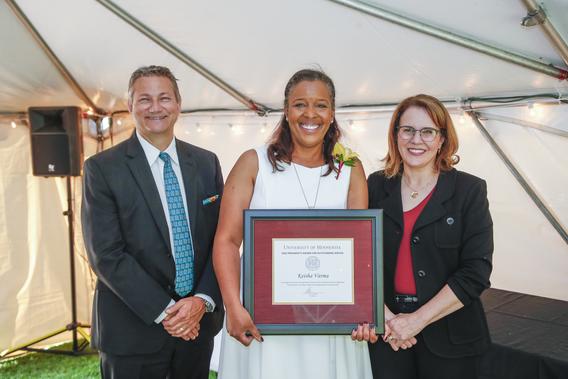
Keisha Varma is an associate professor, Department of Educational Psychology, College of Education and Human Development, and associate vice provost, Office for Equity and Diversity (OED), University of Minnesota Twin Cities. She has served the University since 2008 when she joined the University community as an assistant professor and was promoted to associate professor in 2014. Prior to her current appointment, she served as a faculty fellow in OED’s Institute for Diversity, Equity, and Advocacy. Varma’s service to the University and its community is broad and deep with an emphasis on advancing diversity, equity, inclusion, and belonging. Varma was instrumental in enrolling the University of Minnesota in the University of California’s Partnership for Faculty Diversity, which led to launching the Presidential Postdoctoral Fellowship Program (PPFP) at the University of Minnesota. PPFP is designed to attract the best underrepresented new doctoral graduates to the University and subsequently facilitate placement in tenure-track positions within the University and across the nation. Varma has worked tirelessly to build a sense of community, belonging, and inclusion, not only for the postdoctoral fellows recruited through the PPFP, but for everyone she interacts with. She unstintingly gives of her time and resources to the students she advises. She supports junior faculty by creating pathways for advancement toward tenure and promotion through seminars, programming, community-building opportunities with affinity groups, mentoring programs, and developing a rapport with them as individuals. She created the University’s Social and Racial Justice Scholar Directory to not only highlight the work of the University’s scholarly community, but to generate collaboration in its collective action. Varma was the organizing force behind the 2022 Keeping Our Faculty of Color and Indigenous Faculty Conference, leading the planning committee in conceptualizing and ultimately operationalizing the national event. One letter writer wrote, “What is perhaps most remarkable is how much she seems to truly love this work—to be involved, to make things better for others, to make a difference. She does these things every single day, and I have the privilege of seeing her impact in the way that she selflessly devotes her time to service to this institution and the people in it.”
V. Paul Virtucio
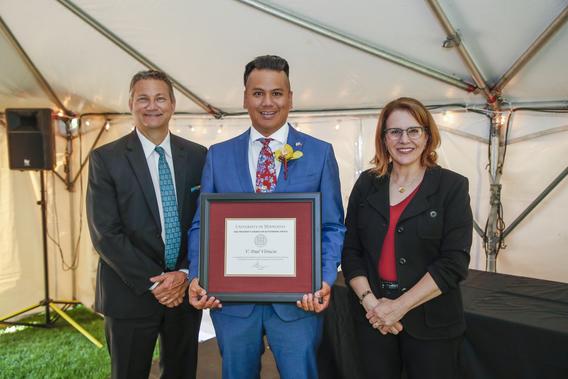
V. Paul Virtucio, service coordinator, Health Sciences Classroom Services, University of Minnesota Twin Cities, is part of a small team that oversees classrooms and classroom technology for the Health Sciences. Since 2015, when Virtucio joined the University community, he has continuously endeavored to create the best possible classroom experience for students, faculty, and campus event attendees. His commitment to his craft, dedication to being a servant leader, and devotion to providing extraordinary service are consistently recognized and applauded by the faculty and staff he works with. Not only does he support technology needs in classrooms, but he shares his knowledge and expertise in a way that those he is supporting can increase their level of comfort and proficiency with technology. Virtucio has set up classroom tours with individual instructors to make sure they are comfortable teaching in the University’s new active learning and hyflex classrooms. He meets individuals at their level of technology expertise with patience, respect, and kindness. Virtucio’s ability to innovate and streamline technology processes has resulted in the University being nimbler and more efficient, especially during the onset of the COVID-19 pandemic. Rather than being satisfied with the status quo, Virtucio is constantly looking for ways to improve technical workflows, navigate complex technology environments, and train others so that they can not only learn, but create and lead, optimal classroom experiences. Beyond being the go-to technology expert in the Health Sciences, Virtucio consults with leaders across the University, and is sought out for collaboration by colleagues in Classroom Technical Services, the Office of Classroom Management, and IT leaders on all University of Minnesota campuses, to name just a few who have benefited from his ingenuity and commitment to excellence. He was a key technical contributor during the planning of the new Health Sciences Education Center and during the transition from WebEx to Zoom as the University’s conferencing platform in 2019. In addition, he was indispensable in coordinating the transition of departmentally-owned technology equipment to the systemwide Kaltura platform. One letter writer described Virtucio this way: “I only wish I could communicate more accurately how universal his reach is within the University community and specifically Health Sciences. He is a powerful force in advocating for seamless and positive classroom learning experiences University-wide.”
Rolf T. Weberg
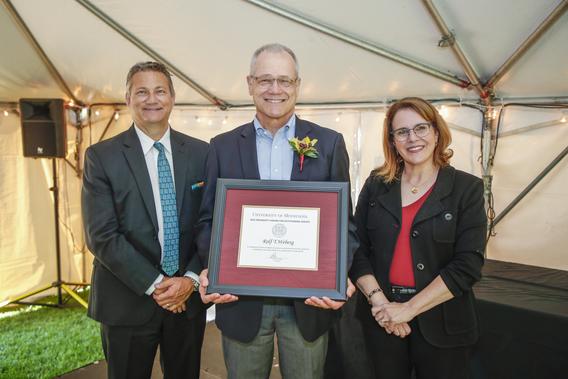
Rolf T. Weberg, executive director, Natural Resources Research Institute (NRRI), University of Minnesota Duluth (UMD), joined the University in 2015 with a mission to transform and strengthen the NRRI. The NRRI was established by the Minnesota legislature in 1983 as an applied science and engineering research organization to inform state citizens and decision- makers while leveraging the power of the University of Minnesota. Weberg immediately began the transformation of NRRI from a quiet UMD research offshoot to a systemwide University asset and professional research organization. He re-envisioned the mission of the institute as well: “to deliver integrated research solutions that value our resources, environment, and economy for a sustainable and resilient future”, which beautifully resonates with the University’s land-grant mission. Under his leadership, practical solutions that support the region and the state are constantly at the forefront of discussion. Weberg has worked tirelessly to strengthen relationships with legislators and increase state funding for the NRRI, including doubling the NRRI State Special allowance and garnering support for its research initiatives in biannual state budgets. He has shepherded numerous initiatives to improve teamwork, center safety in work and lab spaces, support research staff, advance diversity, equity, and inclusion engagement, and update and improve long-neglected facilities. Weberg secured funding to make major improvements to the NRRI’s Duluth and Coleraine facilities, resulting in roof and elevator replacement, LED light replacement, and lab upgrades, as well as adding a position of dedicated safety program manager to lead the NRRI’s new, world-class safety program. He has actively mentored early career scientists, postdocs, graduate students, and interns, leading one postdoc to write, “I have never been associated with an organization whose top-level administrators were so willing to give their time to others in the organization, no matter their position.” Following the murder of George Floyd in 2020, Weberg and ten NRRI employees participated in Unlearning Racism in the Geosciences, a nationally facilitated program exploring bias, racism, and inclusive practices. Participation in the program led him to create the NRRI Diversity, Equity and Inclusion Committee as an effort to ensure NRRI continues to improve and become a better place for everyone. Weberg’s nominator wrote, “Above and beyond is Rolf Weberg’s middle name.”